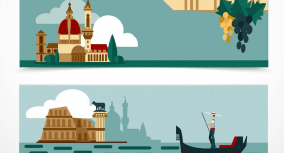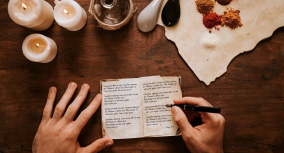Do you know what is crucial for a deep understanding of Othello and practically of the entire Shakespeare’s list of works? The themes! And Shakespeare has a lot to offer. So, this page contains the major themes in Othello. Explore them with us and become an expert in Shakespeare’s art.

Jealousy
Jealousy, or the “green-eyed monster” as Iago refers to it, is the main theme of Othello. Iago’s professional and personal jealousy is integral for the plot progression. Still, other characters, Othello, Bianca, and Roderigo, experience this feeling too. Overall, the theme of jealousy in Othello plays a critical role in getting Shakespeare’s message.
Iago is the most dangerous villain in Othello. His jealousy is detrimental to the characters’ fates. He calls it the “green-eyed monster” as this color is often associated with envy.
His personal jealousy is evident. Iago lustfully desires Desdemona and suspects his wife has cheated on him with Othello. Professional jealousy is reflected in his rage at Cassio. He took the lieutenant position instead of Iago. Just like a monster, Iago’s grudge harms the surrounding people.
Using manipulation techniques, Iago provokes jealousy in Othello. He gradually convinces him in Desdemona’s unfaithfulness. Othello quickly falls victim to such lies due to his insecurities about his skin color and poor origins.
Besides, the villain uses Roderigo’s jealousy towards Othello. Feeling his vulnerability, Iago takes a financial advantage from him. Instead of giving the expensive presents to Desdemona, Iago takes them and sells them for a profit.
Even Bianca’s jealousy is beneficial for the villain. Suspecting that Cassio doesn’t love her, she reveals Desdemona’s handkerchief. This makes Othello rage at his wife, which leads to him murdering her.
Among the diversity of Othello’s themes, jealousy takes the leading role. Shakespeare demonstrates that this envious feeling turns people into ruthless beasts. Being jealous, the characters of the play commit horrible things that lead to fatal results.
Quotes about Jealousy
- IAGO
“O, beware, my lord, of jealousy;
It is the green-eyed monster which doth mock
The meat it feeds on; that cuckold lives in bliss
Who, certain of his fate, loves not his wronger;
But, O, what damned minutes tells he o’er
Who dotes, yet doubts, suspects, yet strongly loves!”
(Act 3, scene 2) - IAGO
“The Moor, howbeit that I endure him not,
Is of a constant, loving, noble nature,
And I dare think he’ll prove to Desdemona
A most dear husband. Now, I do love her too;
Not out of absolute lust, though peradventure
I stand accountant for as great a sin,
But partly led to diet my revenge,
For that I do suspect the lusty Moor
Hath leap’d into my seat; the thought whereof
Doth, like a poisonous mineral, gnaw my inwards;
And nothing can or shall content my soul
Till I am even’d with him, wife for wife,
Or failing so, yet that I put the Moor
At least into a jealousy so strong
That judgment cannot cure.”
(Act 2, scene 1) - EMILIA
“But jealous souls will not be answer’d so;
They are not ever jealous for the cause,
But jealous for they are jealous: ’tis a monster
Begot upon itself, born on itself.”
(Act 3, scene 4) - OTHELLO
“I have done the state some service, and they know’t.
No more of that. I pray you, in your letters,
When you shall these unlucky deeds relate,
Speak of me as I am; nothing extenuate,
Nor set down aught in malice: then must you speak
Of one that loved not wisely but too well;
Of one not easily jealous, but being wrought
Perplex’d in the extreme.”
(Act 5, scene 2)
Women
The role of a woman in society is one of the central themes in Othello. In the context of the 16th-century, Shakespeare illustrates the problem of sexism. There are three women in Othello: Desdemona, Bianca, and Emilia. Each character represents one archetype for the time.
Desdemona is the embodiment of purity. She is loyal to her husband and supports him despite all the obstacles. Moreover, she disobeys her father and gets into uncommon for that time interracial marriage. Generally, Desdemona escaped from her father’s control and got into Othello’s. Being a faithful and supportive wife, she represents the example of the perfect Renaissance woman.
In contrast, Bianca embodies viciousness and raises the sex theme. Having an affair outside of marriage, she is treated like a whore. Cassio and other men don’t respect her, considering her to be insincere and sexually deviant. However, Bianca has a privilege. Not having a husband, she is not considered someone’s property. So, she is freer than Desdemona and Emilia.
Emilia combines Desdemona’s and Bianca’s character traits. On the one hand, she is a loyal wife. She even steals Desdemona’s handkerchief to gain Iago’s appreciation. On the other hand, Emilia is a feminist who raises the problem of sexism in Othello. In her monologue, she contempts men’s unethical behavior towards women.
Overall, the issue of gender roles in Othello is viewed from the perspective of misogyny. Iago is the brightest example of a women’s hater. He expresses his prejudice towards the opposite sex. In the play, the males’ unethical attitude towards females is unfair. Women are more intelligent and multifaceted than men think they are.
Quotes about Women
- OTHELLO
“She says enough; yet she’s a simple bawd
That cannot say as much. This is a subtle whore,
A closet lock and key of villanous secrets
And yet she’ll kneel and pray; I have seen her do’t.”
(Act 3, scene 4) - IAGO (about Desdemona’s and women’s honor in general)
“Her honour is an essence that’s not seen;
They have it very oft that have it not.”
(Act 4, scene 1) - DESDEMONA
“My noble father,
[…]
you are the lord of duty;
I am hitherto your daughter: but here’s my husband,
And so much duty as my mother show’d
To you, preferring you before her father,
So much I challenge that I may profess
Due to the Moor my lord.”
(Act 1, scene 3) - EMILIA
“Let husbands know
Their wives have sense like them: they see and smell
And have their palates both for sweet and sour,
As husbands have. What is it that they do
When they change us for others? Is it sport?
I think it is: and doth affection breed it?
I think it doth: is’t frailty that thus errs?
It is so too: and have not we affections,
Desires for sport, and frailty, as men have?
Then let them use us well: else let them know,
The ills we do, their ills instruct us so.”
(Act 4, scene 3) - IAGO (the unethical attitude towards women)
“This is the fruit of whoring.”
(Act 5, scene 1)
Appearance vs. Reality
One of the most critical themes of Othello is appearance vs. reality. A crafty manipulator Iago creates his reality by deceiving other characters. The villain persuades Othello of Desdemona’s infidelity. He manipulates his wife and uses Roderigo’s vulnerability to satisfy personal needs. Overall, Iago crafts a world that is beneficial for him through the dexterous use of words.
Iago treats Othello as an “ass” and skillfully ingratiates himself with him. So, the Moor believes the villain. Blinded by Iago’s lies, Othello refuses to see the reality, accepting only Iago’s one. The same happens with Roderigo and Cassio. Both characters are naive, so they are incapable of detecting his trickery. They wait for better times with patience, while Iago shamelessly uses them.
Iago is an incredibly skilled manipulator. He even manages to provide an “ocular proof” to persuade Othello of Desdemona’s betrayal. With Emilia’s help, Iago steals the handkerchief that played a detrimental role in Desdemona’s fate.
The irony of appearance vs. reality in Othello lies behind Emilia’s intelligence. She is the first one to understand the sinister nature of Iago. Emilia is a person that Iago is supposed to know the best. Still, he doesn’t manage to deal with his wife, so Emilia reveals the truth.
Iago’s reality via deception is the central issue of the play. Being predisposed to his manipulations, the characters commit fatal mistakes. They lead to horrific demises.
Quotes about Appearance vs. Reality
- IAGO
“When my outward action doth demonstrate
The native act and figure of my heart
In compliment extern, ’tis not long after
But I will wear my heart upon my sleeve
For daws to peck at: I am not what I am.”
(Act 1, scene 1) - IAGO
“The Moor is of a free and open nature
That thinks men honest that but seem to be so;
And will as tenderly be led by th’ nose
As asses are.”
(Act 1, scene 3) - OTHELLO (to Iago)
“Villain, be sure thou prove my love a whore,
Be sure of it; give me the ocular proof:
Or by the worth of man’s eternal soul,
Thou hadst been better have been born a dog
Than answer my waked wrath!
(Act 3, scene 3) - EMILIA
“Disprove this villain, if thou be’st a man:
He says thou told’st him that his wife was false:
I know thou didst not, thou’rt not such a villain:
Speak, for my heart is full. - IAGO
I told him what I thought, and told no more
Than what he found himself was apt and true.”
(Act 5, scene 2)
Racism
Among numerous Othello themes, racism is the most relatable to modern society. The central character is the only black-skinned person in the play. Thus, Othello’s race becomes a reason for prejudice.
In the 16th century, racial discrimination was prevalent. Therefore, the characters of the play disrespect the Moor. Iago, Roderigo, and Brabanito use unflattering racial words to describe Othello. They treat him as an animal or a beast. Such an attitude towards the general is unfair until jealousy overtakes him.
Moreover, the issue of race in Othello is connected with marriage and sexual norms. Back in time, interracial families were viewed as a violation of social rules. So, Brabanito was against Desdemona’s marriage with Othello. He believes that their relationship is a result of the general’s trickery and magic charms.
Being predisposed to numerous offenses, Othello internalizes this prejudice. He accepts his role as an outsider in Venetian society. Thus, the protagonist becomes vulnerable and treats himself disrespectfully. Before death, Othello gives a moving speech where he blames himself for being an outsider. Thus, Shakespeare develops the theme of identity through the lens of racism in Othello.
Othello and his race create a severe conflict that remains relevant even today. To understand the hidden Othello’s meaning, the readers have to dive deep into the issue of racial inequality.
Quotes about Racism
- BARBANITO (to Othello)
“O thou foul thief, where hast thou stow’d my daughter?
Damn’d as thou art, thou hast enchanted her;
For I’ll refer me to all things of sense,
If she in chains of magic were not bound,
Whether a maid so tender, fair and happy,
So opposite to marriage that she shunned
The wealthy curled darlings of our nation,
Would ever have, to incur a general mock,
Run from her guardage to the sooty bosom
Of such a thing as thou, to fear, not to delight.”
(Act 1, scene 2) - IAGO
“I hate the Moor:
And it is thought abroad, that ‘twixt my sheets
He has done my office: I know not if’t be true;
But I, for mere suspicion in that kind,
Will do as if for surety. He holds me well;
The better shall my purpose work on him.”
(Act 1, scene 3) - OTHELLO
“Her father loved me; oft invited me;
Still question’d me the story of my life,
From year to year, the battles, sieges, fortunes,
That I have passed.
[…]
Would Desdemona seriously incline:
But still the house-affairs would draw her thence:
Which ever as she could with haste dispatch,
She’ld come again, and with a greedy ear
Devour up my discourse
[…]
She loved me for the dangers I had pass’d,
And I loved her that she did pity them.
This only is the witchcraft I have used:
Here comes the lady; let her witness it.”
(Act 1, scene 3) - OTHELLO
“Soft you; a word or two before you go.
I have done the state some service, and they know’t.
[…]
Of one not easily jealous, but being wrought
Perplex’d in the extreme; of one whose hand,
Like the base Indian, threw a pearl away
Richer than all his tribe; of one whose subdued eyes,
Albeit unused to the melting mood,
Drop tears as fast as the Arabian trees
Their medicinal gum. Set you down this;
And say besides, that in Aleppo once,
Where a malignant and a turban’d Turk
Beat a Venetian and traduced the state,
I took by the throat the circumcised dog,
And smote him, thus.”
(Act 5, scene 2)






